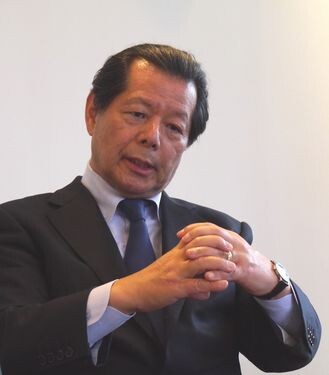hankyoreh
Links to other country sites 다른 나라 사이트 링크
Japanese experts criticize S. Korean response to Sewol sinking

By Gil Yun-hyung, Tokyo correspondent
Japanese observers are voicing bafflement at South Korea’s response to April’s Sewol ferry sinking.
The focus of their confusion is the “moralistic” response, in which the focus in less on figuring out the exact cause of the accident and more on finding “public enemies” to pin the blame on.
Yoichi Funabashi, chairman of the Rebuild Japan Initiative Foundation and a leader of the Independent Investigation Commission on the Fukushima Daiichi Nuclear Accident, expressed concern about the South Korean response to the sinking in a recent interview with the Hankyoreh.
“People are focusing too much on assigning responsibility at a time when we don’t know exactly how the accident happened and we don’t have enough information,” Funabashi said.
“When you focus on the question of responsibility first, the other people involved get scared and don’t want to tell the truth,” he explained. “It becomes that much harder to find out the cause, and when that happens, it’s impossible for society to draw any lessons from the tragedy.”
Kijo Okura, a professor at Kyoto University, voiced a similar opinion in a June 16 interview with the Yomiuri Shimbun newspaper.
Okura also predicted that South Korean society “won’t change very much” after the Sewol sinking, which he blamed on “the social focus on moralism, without any reflection on the ‘good enough mentality’ that caused the accident or the contempt on the ground.”
As an example, Okura pointed to President Park Geun-hye’s response to the actions of the Sewol captain who fled the sinking vessel, which she called an “utterly unacceptable” and “tantamount to murder”. Okura’s argument is that the administration is generating predetermined conclusions in response to public sentiments instead of objectively analyzing the data and assigning punishments according to the law.
In Japan, investigative commissions are formed to investigate accidents with broad social impacts, determining the causes and finding out where responsibility lies. In the case of the Fukushima accident, committees formed at the civilian, government, and parliamentary levels drafted three separate reports. In contrast with Seoul, which has balked at participating in a civilian investigation, then-Prime Minister Naoto Kan was among the 300 social figures who took part in the Japanese civilian study.
The committees sometime fail to determine the cause, as in the case of the Okawa Elementary School tragedy, in which 70 elementary school students lost their lives after the March 11 earthquake. After first being compiled into reports, the studies are then shared with the public through various platforms.
Please direct questions or comments to [english@hani.co.kr]

Editorial・opinion
![[Column] Has Korea, too, crossed the Rubicon on China? [Column] Has Korea, too, crossed the Rubicon on China?](https://flexible.img.hani.co.kr/flexible/normal/500/300/imgdb/original/2024/0419/9317135153409185.jpg) [Column] Has Korea, too, crossed the Rubicon on China?
[Column] Has Korea, too, crossed the Rubicon on China?![[Correspondent’s column] In Japan’s alliance with US, echoes of its past alliances with UK [Correspondent’s column] In Japan’s alliance with US, echoes of its past alliances with UK](https://flexible.img.hani.co.kr/flexible/normal/500/300/imgdb/original/2024/0419/2317135166563519.jpg) [Correspondent’s column] In Japan’s alliance with US, echoes of its past alliances with UK
[Correspondent’s column] In Japan’s alliance with US, echoes of its past alliances with UK- [Editorial] Does Yoon think the Korean public is wrong?
- [Editorial] As it bolsters its alliance with US, Japan must be accountable for past
- [Guest essay] Amending the Constitution is Yoon’s key to leaving office in public’s good graces
- [Editorial] 10 years on, lessons of Sewol tragedy must never be forgotten
- [Column] A death blow to Korea’s prosecutor politics
- [Correspondent’s column] The US and the end of Japanese pacifism
- [Guest essay] How Korea turned its trainee doctors into monsters
- [Guest essay] As someone who helped forge Seoul-Moscow ties, their status today troubles me
Most viewed articles
- 1[Column] The clock is ticking for Korea’s first lady
- 2Samsung barricades office as unionized workers strike for better conditions
- 3After 2 months of delayed, denied medical care, Koreans worry worst may be yet to come
- 4[Correspondent’s column] In Japan’s alliance with US, echoes of its past alliances with UK
- 5[Column] Has Korea, too, crossed the Rubicon on China?
- 6Hong Se-hwa, voice for tolerance whose memoir of exile touched a chord, dies at 76
- 7[Editorial] When the choice is kids or career, Korea will never overcome birth rate woes
- 8Constitutional Court rules to disband left-wing Unified Progressive Party
- 9Nearly 1 in 5 N. Korean defectors say they regret coming to S. Korea
- 10‘Right direction’: After judgment day from voters, Yoon shrugs off calls for change